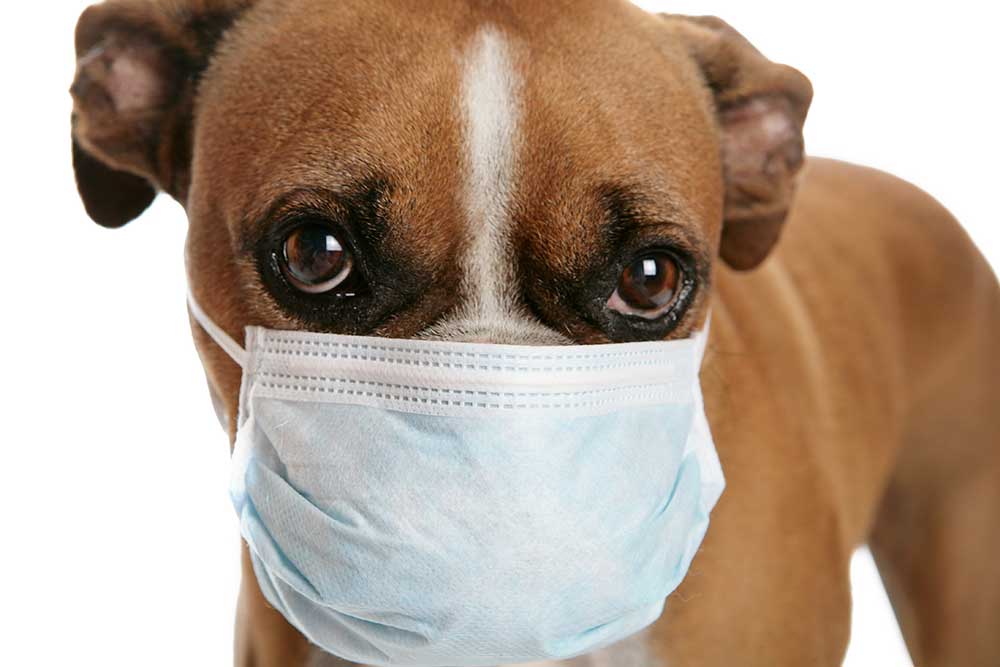
The coronavirus 2019 (or COVID-19) disease, caused by the SARS-CoV-2 virus, is now on the lips of all news readers around the world. The epidemic which started in Wuhan, China, is now raging across the planet and was therefore declared a pandemic on March 11 by the director of the World Health Organization.
Perhaps you have followed the news and know that a tiger from the New York zoo tested positive for the SARS-CoV-2 virus on April 5? In fact, several zoo cats have shown symptoms of respiratory illness following the probable contact with an employee infected with COVID-19.
As this kind of test requires a general anesthesia on such exotic animals, and since these animals had a high anesthetic risk due to their symptoms, it was agreed to test only one tiger for COVID-19, for their safety. It is therefore assumed that these other zoo felines may also have been affected by this coronavirus.
- Click to learn more : ? Protect your pet from VIRUSES with our NATURAL ANTIVIRAL ??
So, what does this mean for our dear pets?
Until now, we thought they were safe from this highly contagious virus. Is this still the case?
Do we need to take extra precautions to protect our dogs and cats from COVID-19?
Certainly, the large family of coronaviruses includes around 40 different viruses and some can actually infect cats and dogs. But what about the dreaded COVID-19 (SARS-CoV-2)?
The rest of this article will answer your questions.
CAN HUMANS TRANSMIT COVID-19 TO ANIMALS?
Now that coronavirus is much more common in society, it has been reported that there is a possibility of infection in animals who are in close contact with humans infected with COVID-19.
As there had been no study on the subject and no case had been reported until recently in animals, the scientific community assumed that the risk of transmission of COVID-19 from a human to an animal was minimal, or even non-existent. However, the recent case of the tiger in New York, the first animal that tested positive for the virus in the United States, has changed this theory.
In addition, a certain number of cases of COVID-19 in dogs and cats have also been reported worldwide.
That said, although it’s possible, the risk of pets being infected with this disease still seems very low. The cases that exist to date are very isolated.
Studies are underway to better understand the transmission of COVID-19 in animals, but for the moment, no scientific study officially confirms the risk of transmission of the virus to our pets.
As of March 25 2020, tests have been done on 17 dogs and 8 cats living in families affected by COVID-19, and only two dogs have tested positive for the virus. However, it is not prudent to draw conclusions from such an experiment, given the low number of subjects tested.
CAN DOGS AND CATS INFECT HUMANS WITH COVID-19?
To date, there is no evidence that pets can transmit the COVID-19 virus to humans.
Although the epidemic is suspected to have an animal source (possibly a bat) and to originate from a live animal market, the virus is now spread from person to person by droplets when an infected person coughs, sneezes or splutters.
I want to be clear about this. While a minority of pets can possibly catch the virus, there is no reason to believe, at present, that dogs and cats can infect humans. And there is no reason to remove an animal from a house, even if you test positive for the virus, unless you yourself are too sick to look after it.
The coronavirus should not be justification for the abandonment of a pet.
If you or a family member becomes ill, simple precautions can be taken to protect your pet from COVID-19.
WHAT PRECAUTIONS CAN WE TAKE TO PROTECT OUR ANIMALS FROM COVID-19?
If you have coronavirus, you should limit contact with your pets as much as possible, just as you would do with those living with you.
If this is your situation, ask someone else in the house to feed your pet, for example. Avoid petting your dog or cat and do not share table food with them. If nobody can help you at home, wash your hands well before and after any contact with your pet.
In short, how to protect your animal from COVID-19:
- If you are sick, ask someone else in your house to take care of your pet.
- If you are sick, avoid touching, petting, or sharing food.
- Wash your hands frequently and cough in your elbow.
- If your dog comes into contact with someone who is contaminated, bathe him with water and pet shampoo.
- Do not use a Purell type disinfectant on the coat of your animals, it is much too strong.
- Keep cats indoors and dogs on a leash when you walk. The virus can survive for a while on their coat, following contact with an infected person.
- Strengthen your pet’s immune system
More generally, even if you are not sick, you can protect your companion by making sure you have stored enough food and medication in the event that you become ill and need to be quarantined.
A STRONG IMMUNE SYSTEM IS THE BEST ASSET FOR FIGHTING A VIRUS
It’s the same principle for any disease.
The body has all the defenses necessary to fight an intruder. It is therefore important to make sure you adopt a healthy lifestyle and a good diet to be sure of putting the odds on your side and on the side of your pet.
This is particularly important in the event of a pandemic.
- Click to learn more : ? Strengthen your pet’s IMMUNE SYSTEM with our Natural Remedy ??
WHAT ARE THE SYMPTOMS OF COVID-19 IN ANIMALS?
As mentioned above, the tiger in New York with COVID-19 had respiratory symptoms.
Some pets who have had this coronavirus have shown no clinical symptoms.
The cases are still too sporadic and the studies too early to draw conclusions. It is therefore difficult to answer this question at the moment.
HOW DOES CORONAVIRUS MANIFEST IN HUMANS?
The new strain of coronavirus, COVID-19, can severely affect some people and cause their death. This new coronavirus causes damage to the respiratory system and has the following symptoms:
- Cough
- Fever
- Shortness of breath
Similar to the flu virus, the symptoms may be minor for some and severe for others, depending on how effective their immune system is at fighting the intruder.
In immunocompromised people, a secondary bacterial infection (pneumonia, for example) can develop and complicate the state of health of those affected.
Other types of coronavirus exist and several can affect our dogs and cats. These are not the subject of a pandemic, like SARS-CoV-2 (COVID-19), but it is still interesting to learn more about what exists in the world of viruses.
CORONAVIRUS (CCOV) IN DOGS
As you probably know by now, coronaviruses are a large family of viruses, characterized by their crown shape. COVID-19 is therefore not the only disease caused by these.
In fact, a dog can contract a canine coronavirus which affects the respiratory system (CRCoV) and two other types of coronaviruses which infect the digestive system (CCoV type I and II).
THE “RESPIRATORY” CORONAVIRUS IN DOGS (CRCOV)
This is part of the kennel cough complex. In other words, when a dog contracts kennel cough from contact with another dog or with a contaminated surface, it catches both this virus (or another), as well as a bacteria (Bordetella bronchiseptica). These act together and cause respiratory problems. This infection is very contagious between dogs.
THE “INTESTINAL” CORONAVIRUS IN DOGS (CCOV TYPE I AND II)
This also causes a very contagious infection, especially in puppies. It mainly causes diarrhea, but is generally without serious consequences. However, it can be dangerous when combined with another disease such as parvovirus.
WHAT ARE THE SYMPTOMS OF CANINE CORONAVIRUS?
The symptoms vary depending on the type of infection, as mentioned above. Here is a list of coronavirus symptoms in dogs according to the type of canine coronavirus.
SYMPTOMS OF “RESPIRATORY” CORONAVIRUS:
- Hoarse cough
- Shortness of breath
- Difficulty breathing
- Decreased energy
SYMPTOMS OF “INTESTINAL” CORONAVIRUS:
- Diarrhea
- Soft stools
- Loss of appetite
- Vomiting (often only once)
- Decreased energy
- Fever (rare)
There is a coronavirus vaccine for dogs for the intestinal coronavirus. However, there is no agreement on it in the veterinary world as this virus mainly affects young puppies. Dogs old enough to be vaccinated are less likely to get the virus.
CAN CORONAVIRUS IN DOGS SPREAD TO HUMANS?
According to current knowledge, dogs cannot transmit coronavirus to humans, regardless of the type (respiratory or intestinal).
However, it can transmit other types of viruses, bacteria or fungi. So, if you are unsure about your dog’s diagnosis, it’s best to check with a vet in order to limit the risk of transmission.
- READ ALSO: ? 7 Alternative Medicine Treatments for Animals
CORONAVIRUS (FCOV) IN CATS
Can my cat get coronavirus? As mentioned above, your cat could possibly catch COVID-19 according to current theories.
Furthermore, it is also vulnerable to feline coronavirus (FCoV). This virus can take different forms, being the intestinal form and the form responsible for feline infectious peritonitis.
FELINE “INTESTINAL” CORONAVIRUS (FECV)
What is coronavirus in cats? The first form of feline coronavirus (FECV) is called feline enteric coronavirus (intestinal) and can cause digestive upset and symptoms such as diarrhea and sometimes vomiting. It is considered mild and is often asymptomatic (without symptoms).
The coronavirus is transmitted very contagiously via stools and saliva. Cats living in communities or sharing a litter box, as well as cats that move about outside are therefore at greater risk of catching this virus.
FIP CATS
Coronavirus in cats becomes worrisome when it causes feline infectious peritonitis (FIP).
What is FIP in cats? Following errors in its replication, the coronavirus undergoes what is called a mutation. It therefore changes from the “intestinal” form to a new form that can cause this very dangerous disease.
How do cats get FIP? The coronavirus in question is mainly transmitted through the stool (oral-fecal contact), but also via aerosols (much like the flu).
Feline infectious peritonitis can progress in two ways, either to a wet or dry form. Among other things, wet FIP results in an accumulation of fluids in the abdominal cavity or chest, which, as you might expect, is not good news.
SYMPTOMS OF CORONAVIRUS IN CATS (FELINE INFECTIOUS PERITONITIS)
Above all, feline infectious peritonitis (FIP) is difficult to diagnose, as a result of its classic symptoms during the early stages. A cat may first lose its appetite, have a fever and be lethargic. A cat with FIP will not improve following antibiotic treatment.
SYMPTOMS OF THE WET FORM OF FELINE INFECTIOUS PERITONITIS (FIP)
Depending on the organs affected, a cat can have different symptoms:
- Accumulation of fluid in the chest can cause breathing problems
- If the digestive system is affected, it may suffer from diarrhea or vomiting
- Weight loss
- Swollen abdomen
SYMPTOMS OF THE DRY FORM OF FELINE INFECTIOUS PERITONITIS (FIP)
The dry form of the disease can affect other organs or systems, such as the eyes, liver, nervous system, or kidneys. Here are some examples of the symptoms of FIP in cats:
- Kidney infection
- Renal failure
- Uveitis
- Vomiting
- Liver failure
- Seizures
- Paralysis
As you can see, the symptoms of cat FIP are very varied, which makes its detection difficult. A definite diagnosis can only be made post-mortem. Some tests do exist, however, to help the vet distinguish feline infectious peritonitis from other diseases.
In summary, pets are probably not immune to COVID-19 (or other coronaviruses, by the way). Although the cases listed are rare at the moment, it is prudent to use precautionary measures in the event that you become ill, in order to protect your dog or cat.
There is still no need to construct a facial mask for your doggie, but if you are sick, physical distancing and hand washing will also be useful to prevent possible transmission of the virus to your animals.
Additionally, strengthening your pet’s immune system helps ensure they have the best defenses against a virus.
Studies are underway to teach us more about this disease in our pets. These experiments take time, so you will have to be patient.
The whole planet is mobilizing to bring us good news as quickly as possible. Until then, it’s important not to jump to any conclusions. Let us take advantage of our isolation to spend quality time with our pets, who themselves benefit from our company more than ever.
We are living in a time of exceptional, historic and difficult crisis. We are a team, let’s support each other through this event.
Everything is going to be alright!










